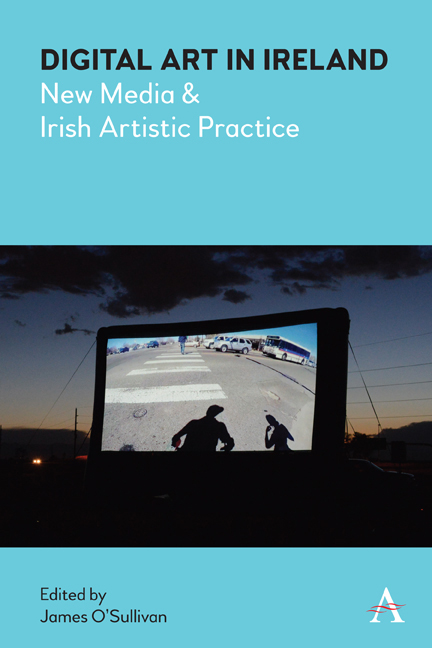Book contents
- Frontmatter
- Dedication
- Contents
- List of Illustrations
- Acknowledgements
- Notes on Contributors
- Chapter 1 Introduction: Digital Art in Ireland
- Chapter 2 Strange Mothers: The Maternal and Contemporary Media Art in Ireland
- Chapter 3 Between Aesthetics and Institutions: Irish Electronic Poetry
- Chapter 4 ‘to shine upon the original all the more fully’: Contemporary New Media Adaptations of James Joyce
- Chapter 5 Art in the Data-City: Critical Data Art in the Age of Surveillance Capitalism
- Chapter 6 Experimental Arcade Video Games as Self-Reflexive Media Art
- Chapter 7 Folding, Unfolding, Refolding Sound Claire Fitch
- Chapter 8 Treacherous Images and Animal Gazes: Ailbhe Ní Bhriain's Reports to an Academy, 2015
- Chapter 9 Pressing Send: Distribution and Curation in Irish New Media Art
- Index
Chapter 7 - Folding, Unfolding, Refolding Sound Claire Fitch
Published online by Cambridge University Press: 23 February 2022
- Frontmatter
- Dedication
- Contents
- List of Illustrations
- Acknowledgements
- Notes on Contributors
- Chapter 1 Introduction: Digital Art in Ireland
- Chapter 2 Strange Mothers: The Maternal and Contemporary Media Art in Ireland
- Chapter 3 Between Aesthetics and Institutions: Irish Electronic Poetry
- Chapter 4 ‘to shine upon the original all the more fully’: Contemporary New Media Adaptations of James Joyce
- Chapter 5 Art in the Data-City: Critical Data Art in the Age of Surveillance Capitalism
- Chapter 6 Experimental Arcade Video Games as Self-Reflexive Media Art
- Chapter 7 Folding, Unfolding, Refolding Sound Claire Fitch
- Chapter 8 Treacherous Images and Animal Gazes: Ailbhe Ní Bhriain's Reports to an Academy, 2015
- Chapter 9 Pressing Send: Distribution and Curation in Irish New Media Art
- Index
Summary
The problem is not how to finish a fold, but how to continue it.
–Gilles Deleuze 1993, 34This chapter provides a commentary on the composition processes of two sonic art works created with the aim to illustrate my contemplation of perception through the act of listening. The perception of a sonic experience that is ‘unique to the perceiver of it, but can never be experienced again’ (Grimshaw 2015, 5) is examined with a consideration of my own experience as a composer, a performer and as an audience with a discussion of the works: And The Birds Sang (2016) and Murdering The Time (2017). This chapter has been previously published as chapter 4 of my PhD thesis at Queen's University Belfast (Fitch 2019).
Perception of a unique event that can never be experienced again is an interesting concept. Sound is something we experience in relation to many factors; it could relate to our personal experiences, our previous knowledge of a genre and also our experience of time. Deleuze discusses perception through the illustration of different levels of time, that it is not internal to us, ‘but that we are internal to time’ (Deleuze 2012, 86), and that these levels of perception are ‘two poles, objective and subjective’ (Deleuze 1986, 71). Deleuze presents objective perception as the overall work, ‘the actual is always objective’ (Deleuze 2012, 86), but that ‘subjectivity is never ours, it is time, that is the soul or the spirit, the virtual’. The virtual, according to Deleuze, is ‘subjective: it was initially the affect, that which we experienced in time’ (Deleuze 2012, 86). Although affect is discussed by Brian Massumi as the ‘primacy of the affective is marked by a gap between content and effect’ (Massumi 2002, 24), it seems there is no logical link between objective and subjective perception. Deleuze carries the discourse further, describing the transformation of perception over time as ‘tiny perceptions are as much the passage from one perception to another as they are components of each perception. They constitute the animal or animated state par excellence: disquiet. These are “pricklings”, or little foldings’ (Deleuze 1993, 87).
- Type
- Chapter
- Information
- Digital Art in IrelandNew Media and Irish Artistic Practice, pp. 105 - 120Publisher: Anthem PressPrint publication year: 2021



